“Once more unto the breach, dear friends, once more;
Or close the wall up with our English dead.
In peace there’s nothing so becomes a man
As modest stillness and humility;
But when the blast of war blows in our ears,
Then imitate the action of the tiger.” –Shakespeare, King Henry V, Act 3, Sc. 1
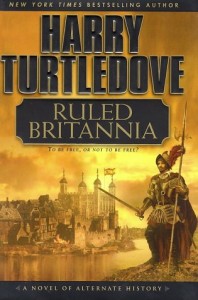 For more than ten years, Harry Turtledove’s Ruled Britannia has been my personal Gold Standard for novels of alternative history. Having just read (and about to review) a new alternative history, I went back to this one to see how it stood the test of time. I liked it even better. Starting with the premise that England did NOT defeat the Spanish Armada in 1588, during the rule of Queen Elizabeth I, author Harry Turtledove puts Elizabeth in the Tower of London and makes King Philip II of Spain the official ruler of Britain, with his daughter Isabella Clara Eugenia representing him on the formerly-British throne. All the leading writers, philosophers, and artists so famous to students of Elizabethan England, when it WAS Elizabethan, are still hard at work in London, but now, their patron is Spanish, not British.
For more than ten years, Harry Turtledove’s Ruled Britannia has been my personal Gold Standard for novels of alternative history. Having just read (and about to review) a new alternative history, I went back to this one to see how it stood the test of time. I liked it even better. Starting with the premise that England did NOT defeat the Spanish Armada in 1588, during the rule of Queen Elizabeth I, author Harry Turtledove puts Elizabeth in the Tower of London and makes King Philip II of Spain the official ruler of Britain, with his daughter Isabella Clara Eugenia representing him on the formerly-British throne. All the leading writers, philosophers, and artists so famous to students of Elizabethan England, when it WAS Elizabethan, are still hard at work in London, but now, their patron is Spanish, not British.
 London citizens have endured the Inquisition, the continued imprisonment of Elizabeth in the Tower of London, the use of Irish barbarians as thugs and enforcers by the Spanish occupiers, and a constant sense of uncertainty born of religious and political turmoil. The pageantry and spectacle of an auto-da-fe, with its awe-inspiring and terrifying burnings at the stake, open this novel, its horrors made real by the cry of a condemned man, begging for help from an acquaintance in the mob, William Shakespeare, who can do nothing to help, and whose own life is endangered by the man’s pitiful appeals.
London citizens have endured the Inquisition, the continued imprisonment of Elizabeth in the Tower of London, the use of Irish barbarians as thugs and enforcers by the Spanish occupiers, and a constant sense of uncertainty born of religious and political turmoil. The pageantry and spectacle of an auto-da-fe, with its awe-inspiring and terrifying burnings at the stake, open this novel, its horrors made real by the cry of a condemned man, begging for help from an acquaintance in the mob, William Shakespeare, who can do nothing to help, and whose own life is endangered by the man’s pitiful appeals.
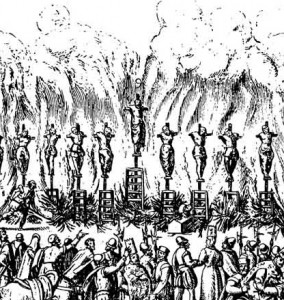
An auto-da-fe, the burning of heretics, shown in contemporary image from 1559
Shakespeare here is at the height of his powers as an actor and playwright. Sharing one-third of a room in a boarding house and eating and writing by firelight in a pub, Shakespeare writes, deals with the egos of his acting company, and manages the Globe Theatre, well-described here, while also associating with people from all walks of society. Mysterious characters like Nick Skeres and the “witch” Cicely Sellis, alternate with more familiar characters such as Christopher Marlowe and the Elizabethan actor Richard Burbage. Sir Francis Bacon and Lord Burghley (Sir William Cecil) play key roles here, too, but it is William Shakespeare who is the pivot around whom all the action revolves. In counterpoint to Shakespeare is Lt. Lope de Vega, an unpublished Spanish playwright, sent by the Spanish king to infiltrate Shakespeare’s theater and its productions and unmask any traitors to Spanish rule.
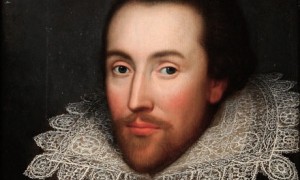
William Shakespeare
Lord Burghley, however, privately rebelling against foreign rule, hopes to inspire a revolt against the Spanish, and he secretly hires Shakespeare to write a play called Boudicca, based on a story by Tacitus in which a queen, defeated by the Romans, revolts against their rule. Planned as a call to the populace to throw off their Spanish yoke and avenge themselves, a production of this play will put Shakespeare in mortal danger–he has also been hired by the Spanish to write a play in honor of Philip II, the dying Spanish king, a play that will be produced as soon as Philip dies. Writing and rehearsing both plays simultaneously with a less than reliable troupe, Shakespeare must walk a fine line to avoid discovery as the mood in London becomes increasingly threatening.
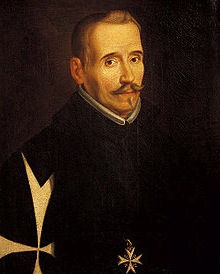
Lope de Vega, Spanish playwright and spy in London
Writing in the language and style of the period, author Harry Turtledove casually (and very skillfully) incorporates innumerable Shakespearean quotations into his text, often with humorous intent, and Shakespeare lovers will be kept busy playing the obvious game of identifying the plays in which these quotations appear. Puns, the off-color wordplay which so often provides comic relief in Shakespeare’s plays, dialogue in which characters talk at cross-purposes, and a character who constantly misuses “big words,” are a delight for language-lovers.
Quotations from Shakespeare’s eventual production of Boudicca, which feel like genuine quotations from a new and undiscovered authentic work, are brilliantly crafted from some of Shakespeare’s works from the period and from those of several contemporaries. The opening night of that play is a stunning literary coup by Turtledove.
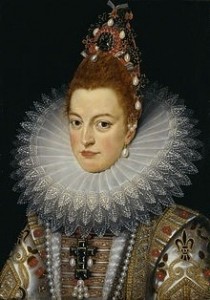
Isabella Clara Eugenia, “Queen” of England under Philip II of Spain
All the talk and intrigue do lead to a plot which is a bit thin and short on action–until the bang-up conclusion, filled with arquebuses, rapiers, poleaxes, pikes, and even chamberpots. His characters, who are given center stage throughout this long novel, feel like real people, and the reader comes to care about them, identifying with the problems they face, despite the more then four hundred year difference in time periods. The novel is clever, beautifully crafted with fine period detail, and a delight to read. Lovers of language will thrill at Turtledove’s achievement here, even while secretly wishing, perhaps, that the book, almost six hundred pages long, were a hundred pages shorter.
Photos, in order: The author’s photo is from http://baen.com
The print of the Auto-da-fe from 1559, appears on http://en.wikipedia.org
The Shakespeare image may be found on
http://www.hamletscenen.dk
Lope de Vega’s portrait is from http://en.wikipedia.org
Isabella Clara Eugenia’s portrait appears on
http://en.wikipedia.org
